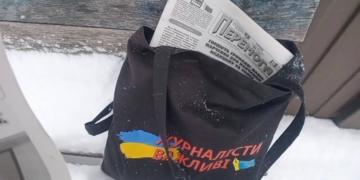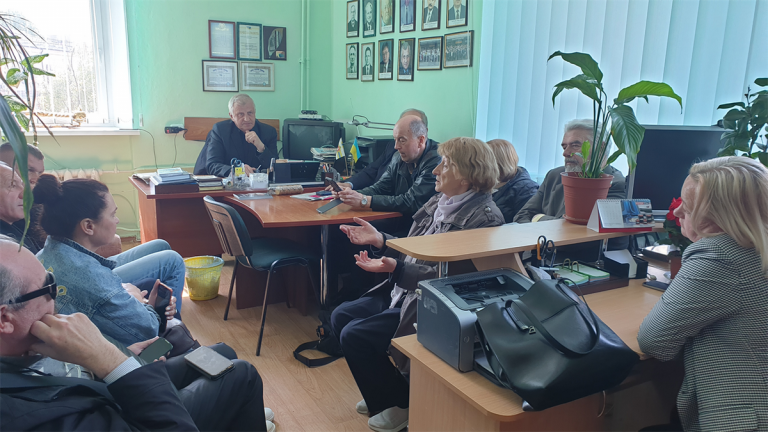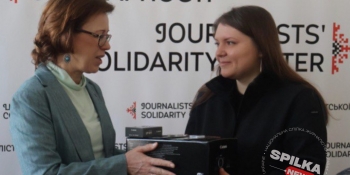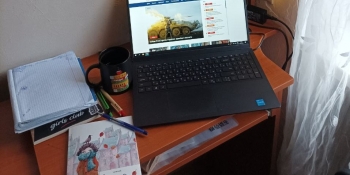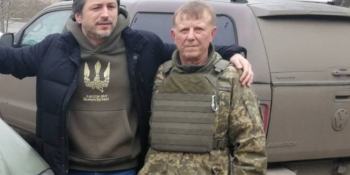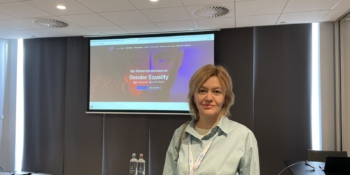“14 local newspapers are published in the Rivne Region, and almost all of them, after the territorial reform, turned from district newspapers into community newspapers (in the region, instead of the former fifteen districts, four were formed),” says Head of the regional organization of the National Union of Journalists of Ukraine (NUJU), Dmytro Tarasiuk.
Historically, newspapers are better subscribed to in the north of the Rivne Region; more periodicals are read there than in the south and center of the region. The current year’s subscription also confirms this.
“Unfortunately, not all newspapers survived, and it didn’t start today. Last year, the Rivne city-district newspaper Slovo I Chas ceased to exist. The main culprit in this, in my opinion, is the editor, on whom at least 75 percent of the publication’s success depends, says Dmytro Tarasyuk. “Who, other than the editor, should see the perspective set the tone in the team’s work, and here the editor sat in the office, waiting for the newspaper to take care of itself.
“A newspaper that does not care about live information, that does not communicate with people on the ground, and relies only on the mercy of postmen for subscriptions, as a rule, has no future,” Dmytro Tarasiuk believes. “So, it turned out that in the Rivne district, which united seven former districts and where more than half a million residents live, there is no, so to speak, any “capital” newspaper.”
The Zdolbuniv newspaper Nove Zhyttia also disappeared. This year, Visnyk Demydivshchyny, a peer of Ukraine’s Independence, stopped publishing.
Survival is a matter of everyone’s own business
Most local newspapers in the Rivne Region are in a difficult economic situation. Along with the decrease in circulation in recent years, first because of the coronavirus restrictions and now because of the war with the Russian aggressor, the volume of advertising has also decreased.
Previously, publications had financial support from concluding coverage agreements, but today the heads of the regional territorial communities state that they do not have such funds. Even the regional government, placing necessary information in local newspapers occasionally, is in no hurry to pay editors enough money.
Forest farms helped local newspapers, which provided a lot of materials and paid for publications in good faith. Now the Rivne forestry is subordinated to the Volyn Region, and the thread of paid publications was also cut off.
“The post office takes a large share of the money received from subscriptions, and if you consider that today’s newspapers have tiny circulations (some do not even have a thousand subscribers), the question “How to exist?” is on the agenda,” emphasizes Dmytro Tarasiuk. “Low circulations in wartime are because people simply do not have the funds for subscriptions. In addition, Ukrposhta, which takes the lion’s share of the subscription funds, does not always provide the service in good faith. Where stationary rural post offices were replaced by mobile ones, newspaper delivery, and subscription processing became difficult. There are many complaints from subscribers. Mobile departments do not follow traffic schedules; they mainly need to “accept payments and issue pensions. In the villages, the postal machines are not delayed, people do not have time to come and issue a subscription, and even those who have managed to subscribe to the newspaper very late.
Staff are made redundant as much as possible
It is difficult to live on the minimum wage, which is what newspapers can offer today, so there are very few young people in the newsrooms of local newspapers. In addition, young people do not see excellent prospects for the local press, so few people are willing to work in local journalism. Today, they think more about any job in Poland and further abroad. The staff is reduced to the utmost: often, the newspaper is made by an editor and a typewriter, which attests to the content’s quality.
“There are also cases when, for instance, the editor of the once powerful newspaper Ridnyi Krai from Hoshcha moved to work at the regional territorial community, where they take care of public relations and receive a decent salary. The newspaper was left by both a typewriter and a journalist. But we must give credit: they do not break ties with Ridnyi Krai: they prepare materials, supervise the process of preparing issues,” says Dmytro Tarasiuk. “The editor can be understood: a person needs to earn money to live, but it is difficult to say how long the newspaper will survive. Now its circulation is 1,500 copies, and one would like to believe it has the stamina to endure and wait for better times for the press.
In Dubno, we have an even more extraordinary example of the Zamok newspaper, which has about…hundreds of subscribers. Zamok has been preserved thanks to the fact that they have their own printing house, where not only the newspaper is printed, but also forms other products, earning money for publishing.
But there is also something positive
Some newspapers in the region find ways not to lose circulation and preserve the team. For example, the newspaper Sarnenski Novyny, headed by an experienced editor Svitlana Liashko has retained its team and has a circulation of 4,500 copies. The Berezne newspaper Nadsluchanskyi Visnyk under the leadership of Nadiya Yarmoliuk, generated 3,000 copies. In Zarichna, which is closest to the Belarusian border, the Polissia newspaper has 2,000 subscribers. Novyny Rokytnivshchyny and Hoshcha-based newspaper Ridnyi Krai have good circulations as of today.
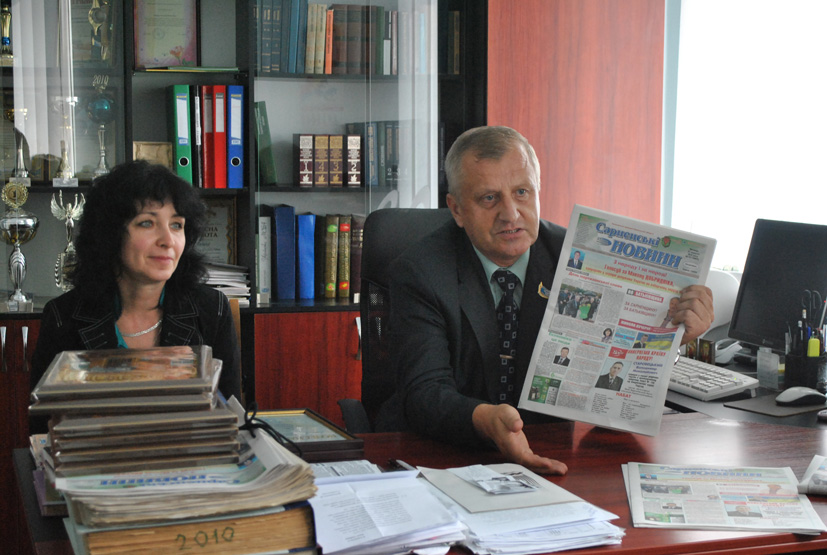
These editions take the reader primarily with their content: people receiving an interesting newspaper find funds for their subscription even from their negligible pensions and salaries.
“We must also mention Volodymyretskyi Visnyk. “If not for the activism of Lyudmila Bosyk, who oriented herself in the modern, difficult realities of wartime, the newspaper could have been on the verge of survival,” says Dmytro Tarasyuk. “The circulation of the newspaper is small” 1500 copies. And the fact that Lyudmila began to take an active part in grant programs helped her to survive economically; with the funds received, she bought a generator, Starlink, and other necessary equipment. Such technological equipment as in Volodymyretsky Visnyk is not available in any newsroom. Also, due to grants, employees here receive a fairly decent salary. Public correspondents are actively preparing materials for the newspaper in Volodymyretsky Visnyk. I believe the staff list should be optimized: for example, a position such as a cashier does not correspond to current working conditions.
In addition to the abovementioned
At one time, with the active participation of Dmytro Tarasiuk, who was a representative of the National Council of Ukraine on Television and Radio Broadcasting in the Rivne Region, three FM radio stations Polissia in Sarny, Burshtynovyi Shliakh in Volodymyrka and Berezne in the district center of the same name were created.
Due to various misunderstandings and quarrels, two radio stations stopped broadcasting after almost ten years of operation, and of all three, only Polissia was preserved. Now, its transmitter is located in Dubrovnik, on the border with Belarus, and this radio is listened to on the other side of the border.
There is practically no local television in the Rivne Region. The regional television, as well as that throughout Ukraine, was destroyed, and now broadcasts the All-Ukrainian Marathon and has a scant amount of time per day to give its news… Rivne-1, Sphere-TV, and ITV are private, and in their programs, which take up no more than an hour a day in the total amount of broadcasting, Dmytro Tarasiuk believes that the views of their owners dominate. The lion’s share here is also occupied by the All-Ukrainian telethon… This is such a disappointing picture in the television and radio space…
Despite all the difficulties and problems of wartime, life in the journalistic environment does not stop: admission to the National Union of Journalists of Ukraine continues, and topical issues are resolved at meetings of the secretariat of the regional organization. The plans for the year include creative contests and awarding of the best journalists with the Mykhailo Horopakha Prize, traditional sports Olympiads, events for Journalist’s Day, and commemorating important dates in the history of media in the Rivne Region, etc. Now, the regional union collected a library of books and handed it over to the soldiers of territorial defense, who protect the borders of Ukraine on the border with Belarus, for which they received sincere thanks.
“It is important for us that our pre-war reader remains with us during the war,” Vitalii Tarasiuk
“The newspaper called Khomin I K is published in the south of the region, where traditionally the circulation is not very high, but it has increased. In particular, the circulation of this newspaper is about a thousand copies, and its subscribers want to see their newspaper in mailboxes under any conditions because it is interesting. All publications are local information beneficially supplemented with materials on local history topics. Editor Vitalii Tarasyuk, his deputy Olha Raiko, and Serhii Husar edit the newspaper make Khomin and K. Take Vitalii from the newsroom, “and the newspaper will disappear,” said Dmytro Tarasiuk, the Head of the Rivne regional organization of the NUJU.
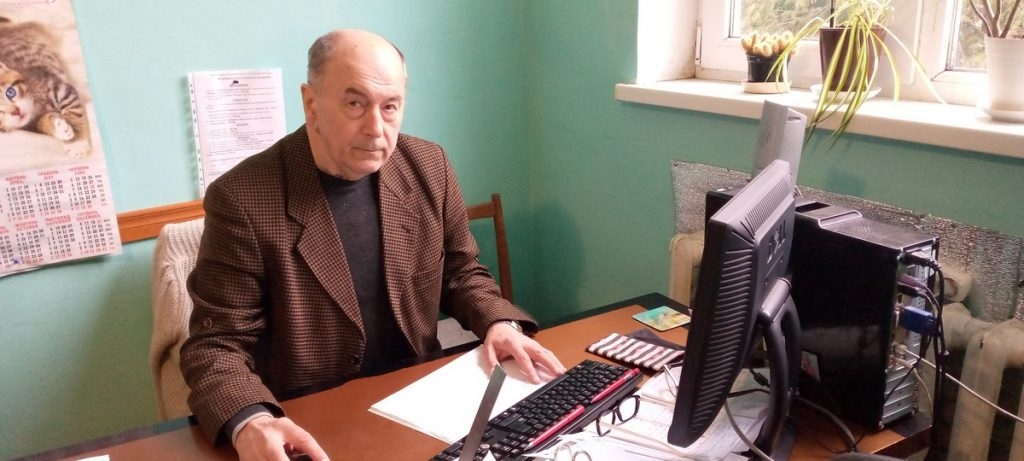
And here is what the editor Vitalii Tarasiuk himself said:
“No matter how difficult it was at the beginning of the large-scale Russian invasion, we did not close down. However, until the summer of 2022, our Khomin and K was not published every week but twice a month. This was due to a sharp increase in the cost of printing, and some other financial and postal problems. The readers were told about the situation, and people understood us. And from the second half of the year, we resumed the weekly release of eight columns, abandoning the traditionally colored pages, which added a significant amount to the cost of printing. The circulation today is a little over a thousand copies, and I would like to print more. But it is essential for us that our pre-war reader remains with us; therefore, the main rule is to “give people exciting information in the newspaper. The majority of materials are local topics; we also provide information from the region and all-Ukrainian, but very little and only that which deserves our reader’s attention.
They held on to the fact that they had a small reserve of funds, which came in handy; they saved on salary when they worked practically on a volunteer basis for a specific time. There were times when one minimum wage was divided by four; now, three employees are on the staff and all work for half the salary. At the same time, taxes are paid in full.
The newspaper does not have permanent agreements for coverage. Still, from time to time, it prepares paid materials for territorial communities, and the two or three thousand paid for publication are not superfluous. Before the war, the regional state administration allocated funds for its publications. But today, the power structures (including military administrations) send materials for publication regularly, but they are in no hurry to conclude coverage agreements. So, newspaper journalists also sort those materials; they give only socially significant ones that people need for information.
The newspaper has some advertising from Ukraine’s Defense Support Union and regional consumer union and earns money by publishing personal ads.
“Some of our people who believe that money is falling from the sky for the newspaper never stop surprising, and persistently ask to give their ad for free. Moreover, as a rule, these people have not the last penny and can pay for ads without any particular problems,” says the editor.
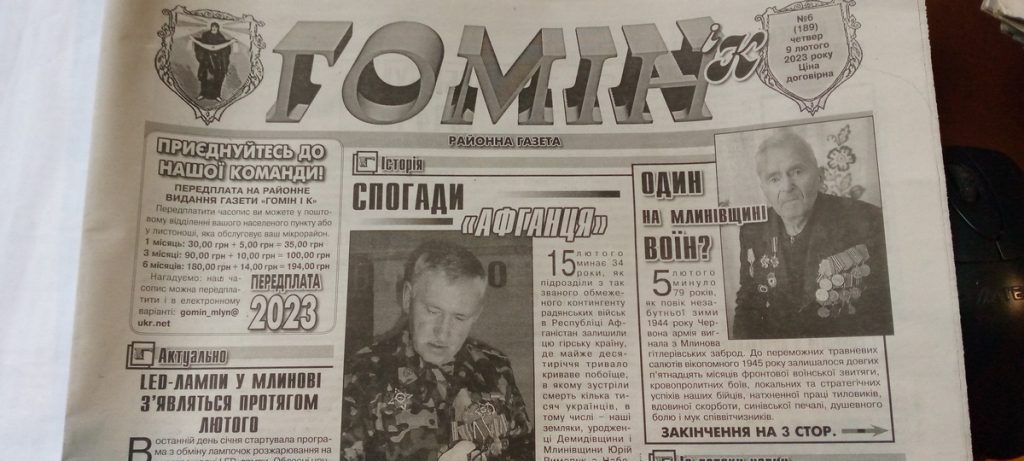
“It’s nice to hear when they say that Nadsluchanskyi Visnyk stands at the level of regional publications,” Chief Editor Nadiya Yarmoliuk
The circulation of Nadsluchanskyi Visnyk is slightly more than 3,000 copies, and this is the second subscription result in the Rivne Region. Like all of them, the volume has been reduced from 12-16 to eight pages, but two pages remain in color. Editor-in-Chief Nadiya Yarmoliuk explains:
“Color pages were kept for advertising: people give greetings for publication but are unlikely to want to see them on a black and white page. While advertising is gradually appearing, we consider any opportunity to attract a potential advertiser who wants to see their messages in the color column.
The publication agreed on coverage of activities with the city council. City council members voted to allocate UAH 70,000 to Nadsluchanskyi Visnyk, which may be increased if the city council’s budget allows it.
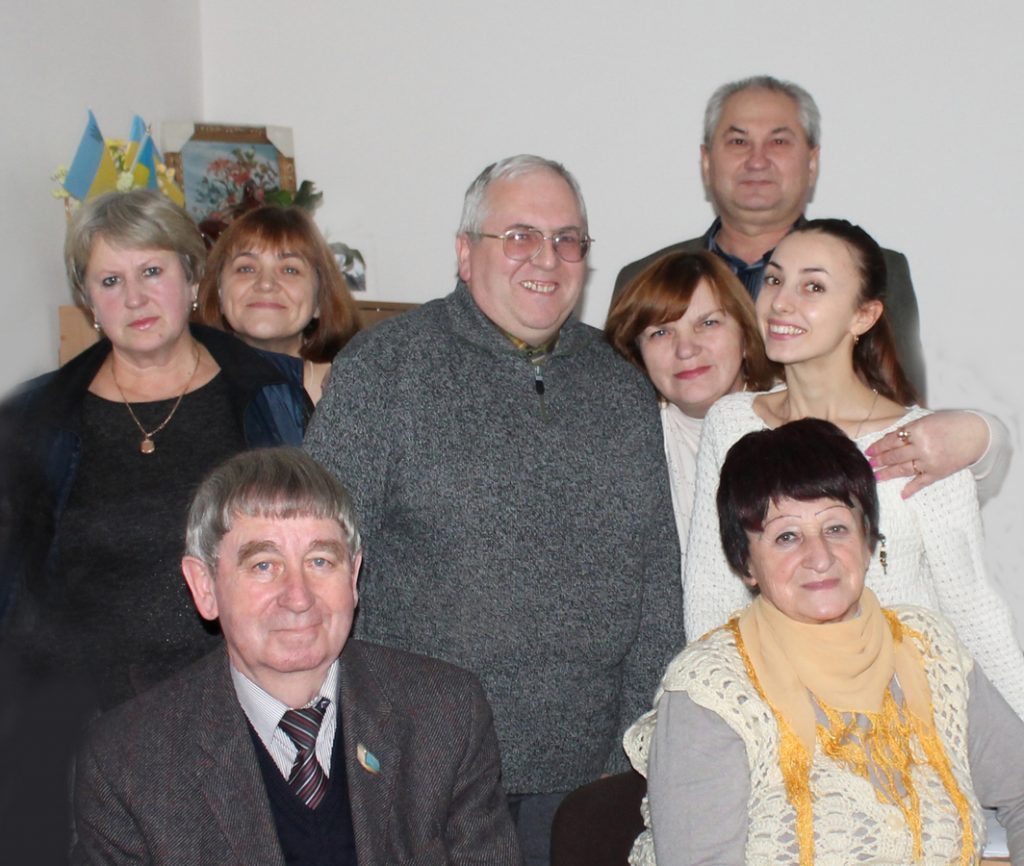
“What annoys and interferes are postal problems. Sometimes there is no mail carrier; sometimes the newspapers are lost, and sometimes they cannot deliver the newspaper on time. Because of this, I believe, in 2023, we will lose about 300 subscribers,” says Nadiya Yarmoliuk.
“The publication’s team consists of eight employees, each of whom can perform several processes. In particular, I am a writing editor; journalists can type, and the executive secretary types the texts of advertisements and announcements and prepares publications. Thanks to our friendly work, most of the materials in the newspaper cover local issues and are interesting. When people come to Berezne and see our newspaper for the first time, they are often surprised at how intellectual it is, and how well-designed and comprehensive it is. It’s nice to hear when they say that Nadsluchanskyi Visnyk is at the level of regional publications.
If we talk about the salary, in the past years, when there was more extensive circulation and the opportunity to earn from advertising, there were supplements to the basic salary, which was normal. Now it is kept at UAH 7,000, and there are no seniority or labor-intensity payments today.
“Our team is not only hardworking but also creative. For a long time, Nadsluchanskyi Visnyk was headed by the poet and member of the National Union of Writers of Ukraine, Boris Borovets. I also have the poetry collections In The Fire Of Maple Debauchery and Gray Hair Of The Autumn Sky in my creative works. Our community residents call another of our journalists the Berezne Songwriter because many songs have been written to his words by local composers,” says the editor. “There are also many talented people among the residents of the Berezne Community. That is probably why the literary pages, the sections Creativity Of Our Readers and Creative Circle Of Vision, attract the reader’s attention. There are traditional sections, such as, Let’s Learn. Let’s Know. Let’s Remember, where we publish materials on the region’s history, Spirituality that reveals the secrets of spiritual education. The large-scale war also made adjustments to the content of the newspaper: stories about compatriots defending Ukraine at the front became frequent on our pages.”
Public correspondents who cover exciting topics and reveal them well are involved in the preparation of materials. Since the newspaper does not have funds for contributors’ fees, the most active newsroom subscribes to the newspaper for free for a year. Berezne newspaper journalists invite public correspondents to the Journalist’s Day celebration, and these meetings take place in a hot, creative atmosphere.
“We all together wish for Victory and peace so that life will improve, and all our readers will return to us,” concludes the editor.
How the great war is stealing the circulation of Novyny Rokytnivshchyny on the border with Belarus
Before the beginning of the large-scale war, the circulation of Novyny Rokytnivshchyny was 3,000 copies, and before the covid pandemic, it had been up to 5,000. Unfortunately, in 2023, the number of subscribers was half that of 1,500, although this is a pretty good result in the region.
The editors said that the main reason for the decrease in circulation is that the Rokytne Community is located on the border with Belarus, and many people have left for safer regions. Of those residents who remained, not all are ready to pay for a newspaper because they do not know what may happen here tomorrow and where this money may be needed, which is not superfluous in every family. That is why the newsroom practices a proven subscription version for a month, quarter, or six months.
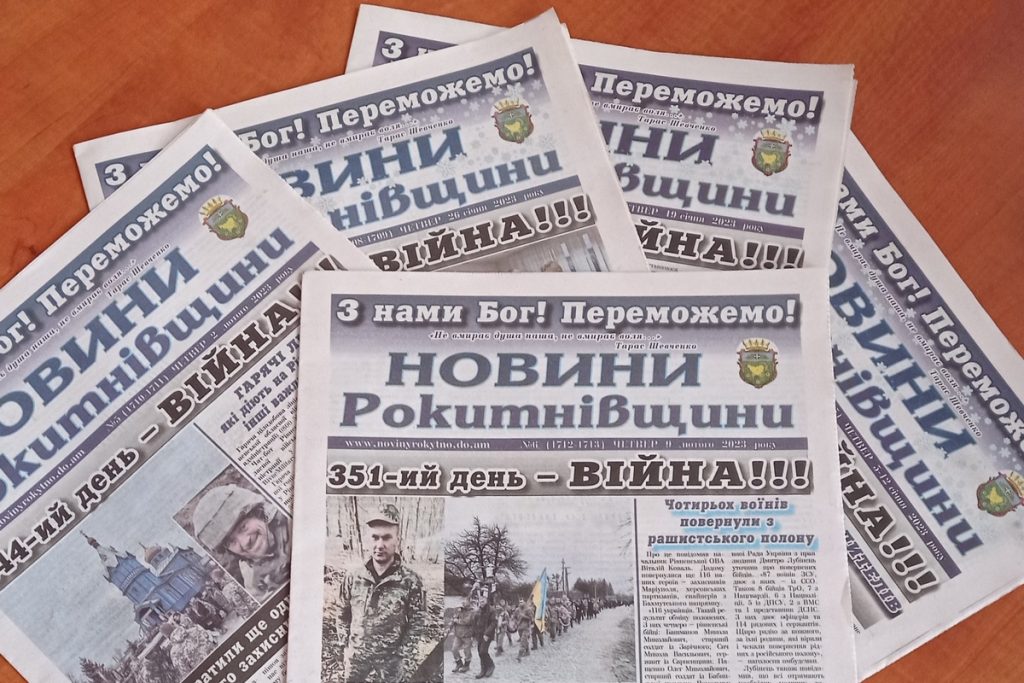
They have a website Novyny Rokytnivshchyny and run a telegram channel. When asked whether the site does not stop subscriptions to the printed version, they say that the site and the newspaper are not duplicated, except that after the issue has been published, its most exciting materials can be posted on the site.
The editors have not missed a single issue since the beginning of the war. There were delays in the delivery of the newspaper, but that, they say, happened due to objective circumstances: the sorting post offices always worked at night, and with the introduction of curfew during the war, they switched to daytime operation only. Therefore, for some time, there were overlays.
“Delivery of newspapers depends on the good faith of the postman,” says editor Nataliya Lozian. “Some work timely, and some may deliver the newspaper a few days late. In every case of delay, we deal with it so that it does not happen in the future. In general, we have established regular cooperation with mail carriers of stationary branches; they also help register subscriptions. We have two mobile offices, and at the beginning, there were often undesirable situations with the delivery of the newspaper and with the registration of subscriptions. But all the same, people who want to read our newspaper come and wait for the postal machine, and until they receive their subscription, the mail carriers are not allowed to go any further. And we are sincerely grateful to our subscribers for such perseverance.
The newsroom does not count on income from advertising. As everywhere in local newspapers, things are wrong with it: the first wave of advertising reduction fell on covid, and the rest remaining was ‘finished’ by the war. Natalia says that even personal announcements and greetings have gone online more: people greet family and friends and give private announcements more through social networks than on newspaper pages.
There is a big problem in the newsroom of Novyny Rokytnivshchyny. It so happened that after the reform, an agreement was not concluded for the lease of the premises, as it was foreseen at the legislative level. And when, after decentralization, the Rokytne District was joined to the Sarny one, the new village authorities declared that the community owns the building where the newsroom is located, so they have the right to dispose of it at their discretion, and half of the editorial premises were taken under the labor archive.
The editors do not understand how and when the community’s ownership of the premises built for the newspaper and printing house was formalized. They cannot prove their rightness to the community’s leadership.
It must be said that the people who work at the newspaper are selfless. Here, everyone has to prepare the materials and organize the pages, which goes on even though they work at half the rate. They survive at the expense of their relatives, who have a salary, and try to save the newspaper until the Victory when all the compatriots return home; the economy will work, and people will have money for subscriptions.
Prepared by Ukrainian journalist Olha Voitsekhivska





